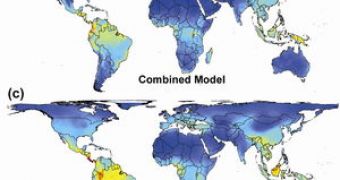Researchers at the University of California, San Diego and the University of Bonn, Germany have realized the first global map of estimated plant species richness.
The map assessed three hundred thousand species and is the most extensive map of the distribution of biodiversity on Earth to date. The map signals very clearly areas of particular diversity, important for conservation, and helps assessing the impact of climate change on the plants' qualities and productivity. The team sought to assess how well the diversity of plant species could be determined by the environmental conditions alone. "Plants provide important services to humans-such as ornaments, structure, food and bio-molecules that can be used for the development of drugs or alternative fuels-that increase in value with their richness," said senior author Walter Jetz, an assistant professor of biology at UCSD.
"Tropical countries such as Ecuador or Colombia harbor by a factor 10 to 100 higher plant species richness than most parts of the United States or Europe. The question is, Why?"
The general understanding among researchers about this striking difference in biodiversity at different latitudes is still largely limited. "Given that we are far off from knowing the individual distributions of the world's 300,000 odd plant species. We investigated how well the richness of plants can be predicted from environmental conditions alone", Jetz said.
The researchers combined field-survey based species counts from over a thousand regions worldwide with high-resolution environmental data to get an accurate understanding of the factors that promote high species richness of plants. "This allowed us to estimate the richness of yet unsurveyed parts of the world. The global map of estimated plant species richness highlights areas of particular concern for conservation and provides much needed assistance in gauging the likely impact of climate change on the services plants provide to humans. It may also help to pinpoint areas that deserve further attention for the discovery of plants or drugs yet unknown to humanity" Jetz said.
"Climate change may drive to extinction plants that hold important cures before we find them," said Holger Kreft, a biologist at the Nees Institute for Biodiversity of Plants at the University of Bonn. "Ecological research like ours that captures complex diversity - environment relationships on a global scale may assist in a small, but important way so that such a fatal potential failure can be averted."

 14 DAY TRIAL //
14 DAY TRIAL //